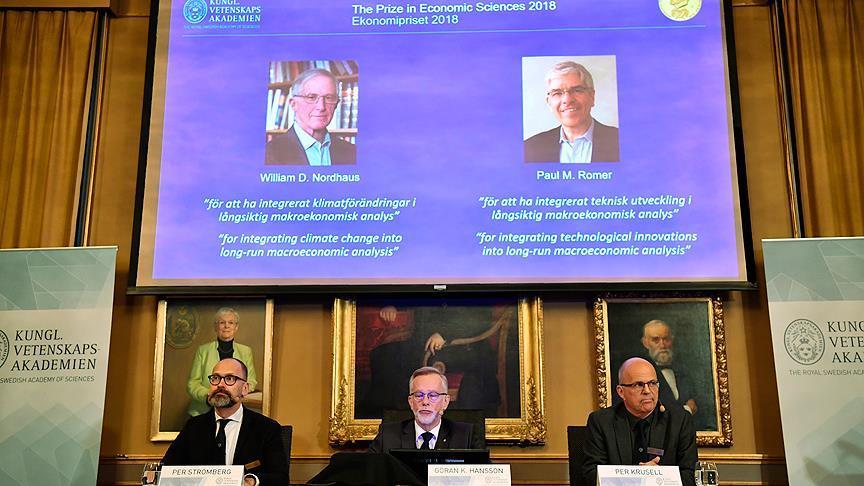
By Muhammed Ali Gurtas
ANKARA
Two U.S. academics focusing on the subject of sustainable growth were honored on Monday with the 2018 Nobel Prize in Economics.
The Royal Swedish Academy of Sciences said that William D. Nordhaus from Yale University and Paul M. Romer from the NYU Stern School of Business won the prize for integrating climate change and technological innovations into
The economists "designed methods for addressing some of our time’s most basic and pressing questions about how we create long-term sustained and sustainable economic growth," the academy said a statement.
"This year’s laureates do not deliver conclusive answers, but their findings have brought us considerably closer to answering the question of how we can achieve sustained and sustainable global economic growth," added the statement.
A reward of 9 million Swedish
Climate change
According to the academy, since the 1970s Nordhaus has been working on the interplay between nature and society as scientists became "increasingly worried about the combustion of fossil fuel resulting in a warmer climate."
"In the mid-1990s, he became the first person to create an integrated assessment model, i.e. a quantitative model that describes the global interplay between the economy and the climate," it said.
The academy said Nordhaus' model harmonizes ideas and outcomes from various fields -- economics, chemistry, and physics.
"Nordhaus’ model is now widely spread and is used to simulate how the economy and the climate co-evolve.
"It is used to examine the consequences of climate policy interventions, for
Technological innovations
Turning to Romer, the academy said: "When
"Previous macroeconomic research had emphasized technological innovation as the primary driver of economic
"Paul Romer solved this problem by demonstrating how economic forces govern the willingness of firms to produce new ideas and innovations," it said.
According to the academy, Romer’s solution -- published in 1990 -- laid the foundation of endogenous growth theory to explain how ideas are different from other goods and require specific conditions to thrive in a market.
"Romer’s theory has generated vast amounts of new research into the regulations and policies that encourage new ideas and long-term prosperity," it added.
The Nobel Prize in Economics, formally called the Sveriges Riksbank Prize in Economic Sciences in Memory of Alfred Nobel, was first awarded in 1968.
Last year, Richard Thaler of the University of Chicago won the Nobel in Economics for his contributions to behavioral economics.
Anadolu Agency website contains only a portion of the news stories offered to subscribers in the AA News Broadcasting System (HAS), and in summarized form. Please contact us for subscription options.







